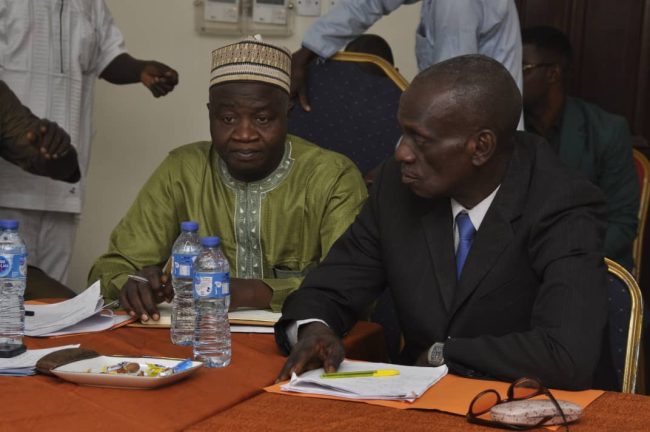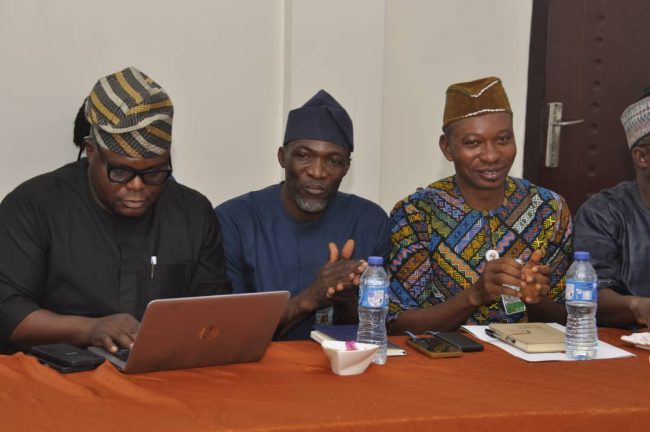
FG Crack Down on Unregistered Cooperatives, Ban Misuse of ‘Cooperative’ in Business Names

The Federal Government has declared its intention to clamp down on unregistered illegal cooperative societies across the country as part of a broader reform agenda to revitalise the sector and boost food security.
The move, spearheaded by the Federal Ministry of Agriculture and Food Security, the supervising ministry with the Federal Department of Cooperatives, saddled with responsibilities of registration, supervision and regulation of cooperative societies with national spread seeks to ensure that only properly registered and accountable cooperatives operate in Nigeria.

Speaking at the Technical Strategy Session on the Implementation of the Cooperative Reform and Revamp Programme in Abuja on Wednesday, the Honourable Minister of State for Agriculture and Food Security, Senator. Dr. Aliyu Sabi Abdullahi CON decried the proliferation of fraudulent cooperatives parading as genuine ones using the word “cooperative” as part of their business names.
He warned that the government would take decisive action to sanitise the system. Speaking to Section 54 sub-sections 1 and 2 of the Nigerian Cooperative Societies Act which prohibits anyone, group or company from trading using the name of Cooperative when they are not registered under the act as a Cooperative, hence using the word Cooperative as part of their business name when not registered as such is an offence under the Act that attracts fines and sanctions.

“We will introduce a new system for registering cooperatives, focusing not only on registration but also on the activities they undertake. It’s misleading to call yourself a cooperative society if you’re not actually registered, and unfortunately, this is happening too often among some unscrupulous individuals. Just recently, in my community, someone deceived people by pretending to represent a cooperative society.” he said.
“We must prevent things like this from happening and even among the cooperative in our various organizations, there are lots of abuses, and we must prevent that. Things like this have to stop. That’s the essence of the Renewed Hope Agenda of President Bola Tinubu’s administration,” he added.

To realize President Bola Tinubu’s vision for a $1 trillion economy, the Federal Government, through the Federal Ministry of Agriculture and Food Security (FMAFS), has confirmed its commitment to revitalizing the cooperative sector. This initiative aims to drive economic growth, promote social cohesion, enhance food security, and reduce poverty in Nigeria..
While estimating cooperatives’ combined asset base worldwide at $19.6 trillion, which generates an annual revenue of $2.98 trillion, the Minister of State for Agriculture and Food Security, Sen. Dr. Aliyu Sabi Abdullahi, said there is a need to chart a new course for the cooperative sector in Nigeria and built on the principles of transparency, accountability, and inclusivity. The Honorable Minister underscored the importance of the cooperative sector in driving economic growth, reducing poverty, and fostering social cohesion.

He noted that the government is committed to creating a transparent and accountable cooperative system that aligns with national development goals.
“Our mission today is to chart a new course for the cooperative sector, one that is built on the principles of transparency, accountability, and inclusivity. We aim to create an enabling environment that fosters innovation, entrepreneurship, and job creation.”
As part of the reform agenda, the Honorable Minister commending the job well-done by the Ministerial Technical Working Group (TWG), revealed that the ministry would review the Final Report of the Ministerial Technical Working Group on the Cooperative Reform and Revamp Programme to develop an effective implementation strategy.

The restructuring of the Federal Department of Cooperatives and the repositioning of Federal Cooperative Colleges were also listed as key priorities.
“We will discuss strategies for repositioning the Federal Cooperative Colleges in Nigeria. Our goal is to ensure that these institutions are equipped to provide high-quality training and education, preparing our youth for the challenges of the 21st century,” he added.

Dr. Abdullahi, further emphasised that Nigeria must learn from successful cooperative models in other countries, particularly in the area of capital mobilisation.
“Part of the reform is mirroring successful countries that have done very well, including capital mobilization, so that access to cooperative capital can become very simple.” He hinted at the possible formation of a Bank solely for the Cooperative Societies in Nigeria very soon.
In his welcome address, Director of the Federal Department of Cooperatives Mr. Idris Ali Sani highlighted the need for Nigerian cooperatives to contribute meaningfully to the country’s economic development, stressing that the reform program was crucial in making the sector more productive.
“We are all aware that the ministry is implementing the Cooperative Reform and Revamp Programme for Nigeria. It is also important for us to understand that cooperatives around the world are greatly contributing to the development of many nations,” he said.
“It is on this note that the Minister took it upon himself to reposition the Nigerian cooperative sector following the introduction of the reform and revamp programme so that the Nigerian cooperative community will be revitalized to generate income and contribute to the nation’s socioeconomic development,” he added.

Earlier in his opening remarks, the Special Assistant to the Minister of State on Cooperatives and Farmers’ Welfare, Hon. Victor Oyegoke pointed out that the programme would provide a comprehensive approach toward integrating youths, people with Disabilities (PWDs), and Gender inclusiveness into cooperatives by fostering collaboration with organizations like the European Union.
The Minister called for increased collaboration between the government, private sector, and cooperative societies to ensure the success of the reform initiative.

“As we move forward, we recognize that our success will depend on collaboration and partnerships. We will work closely with all critical stakeholders, including cooperative societies, the private sector operators, and civil society organisations,” he said.

